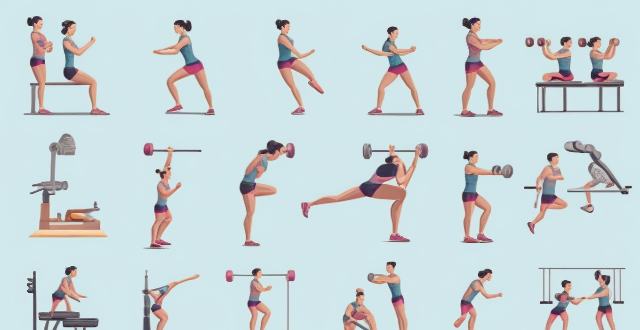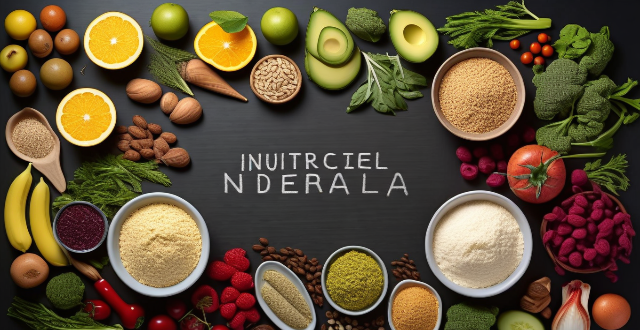Nutrition Physiology

What is the relationship between exercise physiology and nutrition for athletes ?
The article discusses how exercise physiology and nutrition are interconnected for athletes, with each influencing the other. It defines exercise physiology as the scientific study of how the body functions during physical activity, covering areas like energy systems, muscle function, cardiovascular responses, respiratory functions, and thermoregulation. Nutrition for athletes involves strategic eating plans to enhance performance, aid recovery, and maintain overall health, focusing on macronutrients, micronutrients, hydration, and timing of intake. The intersection of these two aspects includes fueling performance, recovery and repair, hydration and thermoregulation, energy balance, supplementation, and dietary needs variation. A comprehensive understanding of both exercise physiology and nutrition is crucial for athletes to achieve peak performance.

How does exercise physiology contribute to understanding the aging process and its effects on physical performance ?
Aging is a complex biological process that affects all living organisms, involving a gradual decline in physical and mental functions over time. Exercise physiology, the study of how the body responds to exercise, plays a crucial role in understanding the aging process and its effects on physical performance. As we age, our muscle mass and strength tend to decrease, cardiovascular fitness reduces, and joint pain and stiffness become more common. Exercise physiology helps us understand how the body adapts to regular physical activity at different stages of life, preventing age-related declines and promoting healthy aging through targeted exercise programs.

What are the latest research findings in exercise physiology that can benefit amateur athletes ?
This text discusses the latest research findings in exercise physiology for amateur athletes, including the benefits of High-Intensity Interval Training (HIIT), recovery techniques, nutrition and hydration, and mental health strategies. Incorporating these findings can help amateur athletes improve their performance, prevent injuries, and achieve their fitness goals.

What is the role of exercise physiology in improving athletic performance ?
Exercise physiology, a branch of science that studies the body's responses to physical activity, is crucial for improving athletic performance. It helps in understanding the body's reaction to different exercises, training methods, and recovery strategies. By applying these principles, athletes can optimize their training programs and enhance their results in sports. The text discusses the following key points: 1. **Understanding the Body's Response to Exercise**: This includes the differences between aerobic and anaerobic energy systems and muscle fiber types, which are crucial for determining suitable exercises for various activities. 2. **Optimizing Training Programs**: Periodization, intensity, and volume are essential elements in planning effective training programs. 3. **Recovery Strategies**: Proper nutrition, sleep, and active recovery techniques aid in post-exercise recovery. 4. **Injury Prevention and Rehabilitation**: Biomechanics, strength, and flexibility training play significant roles in preventing injuries. In conclusion, exercise physiology provides valuable insights into how the body responds to various training stimuli and recovery strategies, allowing athletes to make informed decisions about their training programs. This knowledge enables them to improve performance, prevent injuries, and achieve their goals more effectively.

How does exercise physiology explain the differences in fitness levels among individuals with different genetic backgrounds ?
Exercise physiology explores the interaction between genetic factors and environmental influences like exercise, nutrition, and sleep to explain variations in fitness levels among individuals. It examines how muscle fiber composition, cardiovascular efficiency, metabolic rate, and body composition affect one's ability to perform physical activities. While genetic background sets a baseline for fitness potential, lifestyle choices significantly impact an individual's actual fitness outcomes. By understanding these principles, individuals can optimize their fitness through targeted exercise training, proper nutrition, and adequate rest.

Can exercise physiology be used to treat chronic diseases like diabetes and hypertension ?
Exercise physiology can be effectively used to treat chronic diseases like diabetes and hypertension by improving blood sugar control, aiding in weight management, reducing blood pressure, and enhancing cardiovascular health. Individualized exercise programs, education on lifestyle modifications, and consistent support from professionals contribute to better disease management and overall well-being.

What role does nutrition play in maintaining personal hygiene ?
The article emphasizes the importance of nutrition in maintaining personal hygiene. It suggests consuming nutrient-rich foods, developing healthy dietary habits, and supporting the immune system through nutrition to improve overall health and hygiene.

How does climate change affect food security and nutrition ?
Climate change significantly impacts global food security and nutrition by causing extreme weather events, altering ecosystems, reducing water availability, affecting marine life, posing agricultural challenges, and diminishing nutrient intake. Mitigation strategies include sustainable agriculture practices, dietary diversification, and research and development to ensure future food security and nutrition.

What is the importance of nutrition in competitive sports ?
In competitive sports, nutrition plays a crucial role in enhancing athletic performance, promoting recovery, and maintaining overall health. Athletes need to consume a balanced diet that provides them with the necessary nutrients to support their training and competition demands. In this article, we will discuss the importance of nutrition in competitive sports and how it can help athletes achieve their goals.

How does exercise physiology help in preventing sports injuries ?
Exercise physiology helps prevent sports injuries by understanding body mechanics, energy systems, and recovery needs. Athletes can reduce injury risk through proper warm-up/cool-down, cross-training, progressive overload, and sufficient recovery time.

What are the best practices for sports nutrition in managing a healthy lifestyle ?
Sports nutrition is key to managing a healthy lifestyle. Best practices include staying hydrated, eating a balanced diet with carbohydrates and protein, choosing healthy fats, timing meals around workouts, using supplements cautiously, and prioritizing recovery through rest and proper post-workout nutrition. Consulting with a registered dietitian or healthcare professional can provide personalized advice.

How does nutrition impact women's mental health ?
Nutrition has a significant impact on women's mental health. Eating a balanced diet with adequate amounts of vitamins, minerals, and nutrients can help improve mental health. Avoiding processed foods and sugary drinks, drinking enough water, eating breakfast regularly, and getting enough sleep are also essential for good mental health. By taking care of their bodies through nutrition, women can take care of their minds.

Can nutrition affect an athlete's skill level ?
Nutrition is vital for athletes' overall well-being and performance, including skill enhancement, recovery, and injury prevention. It affects cognitive function, physical performance, and recovery, ultimately influencing an athlete's skill level. A balanced diet with proper nutrients can help athletes reach their full potential and succeed in their sports.

How can nutrition affect an athlete's performance ?
Nutrition plays a pivotal role in an athlete's performance, providing essential energy, aiding recovery, and maintaining overall health. A balanced intake of macronutrients, such as carbohydrates for immediate energy, proteins for muscle repair and growth, and fats for long-term energy, is crucial. Micronutrients like vitamins and minerals also contribute to metabolic functions and electrolyte balance. Hydration is vital for fluid balance and preventing performance decline due to dehydration. Timing of nutrient intake, before, during, and after exercise, significantly impacts performance and recovery. Strategic dietary planning, including periodized nutrition and anti-doping compliance, ensures athletes meet their specific needs and maintain clean sport standards. Overall, a well-structured nutritional plan can enhance athletic performance and success in sports.

What role does nutrition play in sports career management ?
Nutrition is a critical component in managing a sports career, as it fuels performance, supports health, aids in weight management, and contributes to mental well-being. Athletes must focus on hydration, balancing macronutrients, ensuring micronutrient intake, timing meals appropriately, and judicious use of supplements. A personalized nutrition plan can optimize training, competition outcomes, and longevity in a sports career.

Can exercise physiology help in managing stress and anxiety levels ?
Exercise physiology plays a significant role in managing stress and anxiety levels by promoting various physiological responses that counteract the negative effects of these conditions on the body. By incorporating regular physical activity into your lifestyle, you can improve your overall mental well-being and reduce the impact of stress and anxiety on your daily life.

Is it necessary to take supplements for sports nutrition ?
Supplements for sports nutrition are a controversial topic, with some athletes swearing by them and others considering them unnecessary or even harmful. The necessity of taking such supplements depends on various factors including an individual's diet, training intensity, and specific goals. Sports nutrition supplements come in various forms like pills, powders, bars, and liquids, and include protein supplements, creatine, beta-alanine, caffeine, BCAAs, pre-workout formulas, and post-workout formulas. While a balanced diet can provide most of the nutrients needed for optimal athletic performance, there are certain situations where supplements may be beneficial. These include inadequate nutrient intake from food alone, high-intensity or endurance training, and specific goals or deficiencies. However, there are also potential risks associated with taking sports nutrition supplements, such as overconsumption and imbalanced nutrient intake, contamination and quality concerns, and interactions with medications or other supplements. Therefore, it is essential to choose reputable brands, check for third-party certifications whenever possible, and consult with a healthcare professional before starting any new supplement regimen. In conclusion, whether or not it is necessary to take supplements for sports nutrition depends on individual circumstances. While they can offer benefits for certain athletes and scenarios, they should not replace a well-rounded diet rich in whole foods. Before incorporating any supplements into your routine, consider your specific needs and goals and consult with a qualified healthcare professional or registered dietitian for personalized advice.

What is the importance of nutrition in sports medicine ?
The article discusses the importance of nutrition in sports medicine, emphasizing its role in providing energy for exercise, preventing injuries, enhancing performance, aiding recovery, supporting the immune system, and contributing to mental well-being. It highlights the specific nutrients that are crucial for athletes, such as carbohydrates for energy, protein for muscle repair, iron for oxygen transport, B vitamins for energy conversion, and antioxidants for cell protection. The article also emphasizes the need for a balanced diet to prevent illnesses and improve overall health. It suggests that athletes should work with sports nutritionists to develop personalized diet plans that meet their specific needs and goals.

What role does nutrition play in a comprehensive sports training program ?
Nutrition is a crucial component of sports training, providingNutrition is a crucial component of sports training, providing repair, boosting immunity, providing energy, supporting recovery and repair, boosting immunity, and maintaining hydration. Athletes should consume a balanced diet with carbohydrates, proteins, and fats for optimal energy production. Pre-exercise meals should focus on carbohydrates, during-exercise snacks can include simple sugars for quick energy release, and post-exercise meals should combine carbohydrates and protein for recovery. Proper nutrition strategies can improve athletic performance and overall well-being.

What role does nutrition play in sports research and development ?
Nutrition is crucial for athletes' performance, recovery, and overall health. It impacts energy production, recovery and repair, hydration, and more. Researchers study the effects of ergogenic aids, supplements, and nutritional strategies to optimize sports performance. Athletes need to consume the right nutrients to fuel their bodies for peak performance.

What is the difference between sports nutrition supplements and regular multivitamins ?
Sports nutrition supplements are designed for athletes and those who engage in regular physical activities, aiming to improve performance, increase muscle strength, and support recovery. Common ingredients include protein, creatine, beta-alanine, BCAAs, and caffeine. In contrast, regular multivitamins cater to the general population, focusing on maintaining overall health by filling nutrient gaps. Typical ingredients are vitamins A, C, D, E, K, B-complex, minerals like calcium, iron, zinc, magnesium, and trace elements. The benefits of sports nutrition supplements revolve around enhanced athletic performance, while regular multivitamins promote immune function, nutrient intake, and general well-being.

Can taking sports nutrition supplements lead to health risks or side effects ?
Sports nutrition supplements can enhance performance and recovery but may pose health risks and side effects such as overdosing, contamination, interactions with medication, and allergic reactions. However, when used appropriately, they can also improve performance, increase muscle mass, aid in recovery, and replenish nutrients. It is crucial to research each supplement, follow recommended dosages, and consult with a healthcare professional to minimize risks and maximize benefits.

What are the key elements of a baby's nutrition during the first year ?
Infant nutrition is crucial for growth and development during the first year. Key elements include breast milk or formula as the primary source of nutrition, the introduction of solid foods around six months, iron supplementation for breastfed babies, vitamin D supplementation, limited fluid intake in the first six months, the introduction of allergens one at a time, and no evidence that early gluten introduction prevents celiac disease. Consulting with a healthcare professional is recommended for specific dietary needs or concerns.

In what ways does climate change contribute to poor nutrition and malnutrition ?
Climate change affects nutrition and health by causing extreme weather events, changes in crop production, loss of biodiversity, food security issues, and limited access to clean water. These factors can lead to malnutrition and related health problems. It is important to take action to mitigate the effects of climate change and ensure that everyone has access to adequate nutrition and resources for good health.

How important is nutrition in optimizing athletic performance at a competitive level ?
Nutrition is crucial for athletic performance, providing energy, aiding recovery, and maintaining health. Key aspects include consuming carbohydrates for energy, proteins for muscle repair, staying hydrated, obtaining necessary micronutrients from a varied diet, timing nutrient intake around exercise, and personalizing nutrition plans. These practices help athletes maximize their training and competitive outcomes.

What kind of food and nutrition should I provide for my pet to ensure its health ?
To ensure your pet's health, it is crucial to provide the right food and nutrition. Understanding your pet's species-specific dietary requirements, choosing high-quality pet food, supplementing with fresh foods, monitoring your pet's weight and health, and staying informed about pet nutrition research are key aspects to consider. Tailor your pet's diet to their individual needs for a long and healthy life.

How does exercise physiology explain the benefits of high-intensity interval training (HIIT) ?
High-intensity interval training (HIIT) is a form of exercise that involves short, intense bursts of activity followed by periods of rest or low-intensity exercise. From an exercise physiology perspective, HIIT offers numerous benefits, including increased metabolic rate, improved cardiovascular health, muscle development and endurance, favorable hormonal responses, mental health advantages, reduced injury risk, and time efficiency. These factors make HIIT a popular and effective method for achieving various fitness goals.

Are sports nutrition supplements necessary for casual athletes, or only for professionals ?
The text discusses the necessity of sports nutrition supplements for both professional and casual athletes. Professional athletes often require such supplements due to their intensive training regimens, which can deplete essential nutrients and energy stores. On the other hand, casual athletes typically aim for health benefits and moderate fitness improvements, which can usually be achieved through a balanced diet without extra supplementation. The text emphasizes the importance of consulting with a healthcare professional before starting any supplement regimen, understanding individual needs, researching evidence-based products, and monitoring potential side effects. In conclusion, while sports nutrition supplements can be beneficial for professional athletes, they are generally not necessary for casual athletes who can meet their nutritional needs through a well-rounded diet.

Can taking sports nutrition supplements compensate for a poor diet and lack of exercise ?
Sports nutrition supplements cannot fully compensate for a poor diet and lack of exercise. While these supplements can provide certain nutrients essential for athletic performance, they cannot replace the overall benefits of a healthy lifestyle. A balanced diet and regular exercise are crucial for maintaining good health and supporting athletic performance. Supplements should be used cautiously and with guidance from a healthcare professional to ensure they complement your overall lifestyle rather than replace it.